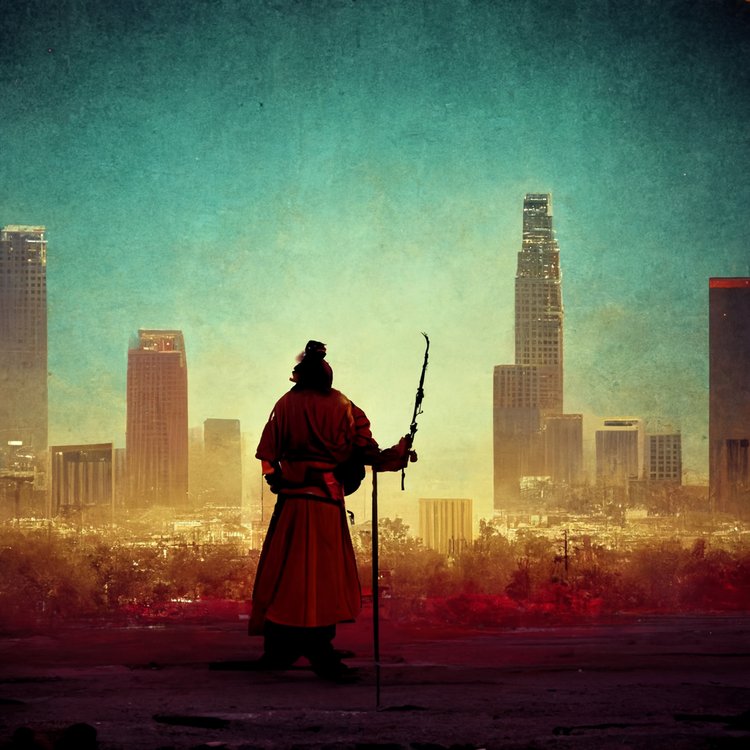
 [rating=3]Life has finer gradations than just black and white, as Jayden (Simon Gebremedhin) comes to understand in “The Great Khan”, written by Michael Gene Sullivan and directed by Jamal Howard. In this coming-of-age story, Jayden is an African American teenager who is learning how to navigate a complex world while working to discover his identity and unique life path.
[rating=3]Life has finer gradations than just black and white, as Jayden (Simon Gebremedhin) comes to understand in “The Great Khan”, written by Michael Gene Sullivan and directed by Jamal Howard. In this coming-of-age story, Jayden is an African American teenager who is learning how to navigate a complex world while working to discover his identity and unique life path.
The beginning of the play is brilliant: deadly serious yet wildly comedic. Before the show starts, we see a nicely-crafted set consisting of a messy bedroom, full of moving boxes and clothes spread out all over the floor. Nothing is unpacked. Jayden’s mother (LaTorious Givens) has just moved the two of them into a new apartment in an area of city away from their old neighborhood, because she was upset about the crime there. We see Jayden listen to his music until he takes off his glasses and goes to bed. It is then that a prowler opens his window in the middle of the night and climbs into his bedroom. In the shadows, the prowler sneaks around the room—and we see the outline of a gun. Suddenly, the young man is startled by the noise and wakes up. But as it turns out, he is acquainted with the person who has invaded his space. It is a young woman named Ant (Monique Marshaun), a classmate from his former high school. She has done considerable research and has found out where he lives, even though he and his mother had left no forwarding address. Ant waves around the gun and plays the role of the “tough girl.” She is upset with Jayden, because (it is implied) that he once came to her rescue, and she could have none of that! What becomes clear is that he was subsequently threatened by gang members: yet another reason for his family to vacate the old premises.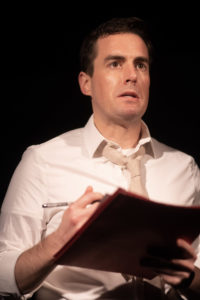
In the daytime hours, Jayden attends his new high school and contends with being “the new kid on the block.” He finds himself in a class on the history of the Middle Ages, taught by a (white) teacher (Bryan Breau). By starting school in the middle of the semester, Jayden has missed his opportunity to choose his own research topic, so his teacher assigns one to him: to write about Genghis Khan. Plus, he has to work on this project together with another student Gao-Ming (Josie Mi). In contrast to Jayden, who is initially resistant about the assignment, Gao-Ming is anxious to study an Asian historical figure who has been the source of considerable controversy among her parents. Her mother equates Genghis Khan with ruthlessness and brutality, equating him to Hitler, whereas her father is more open-minded about the warrior’s legacy. What happens, however, is that in the course of studying The Great Khan, the man actually shows up in person (Steffen Diem Garcia), and Jayden talks to him at length in his room!
Considering that Khan is Asian, Jayden discovers that the idea of race is much more complicated and multifaceted than he had previously considered. The two of them have an amusing conversation of how people’s skin colors are not white and black but shades of pink and brown; they discuss ethnicity and geopolitics in a similarly frank and earnest way. Jayden also learns from Khan that history is not just names, dates, and places, written down in books, and it is not just the invention of the white man to the exclusion of everybody else. While Jayden and Ant both believe that “history is written by the winners”, Khan points out that sometimes it’s written by the losers “and those who haven’t yet been conquered.” When Jayden and Khan play several rounds of video games together, Khan teaches him that all the norms and conventions we have today regarding war did not hold in other time periods. By extension, this applies to most aspects of life. Khan’s most important lesson, however, is explaining that while rules change, people are pretty much the same throughout time. They go through similar human experiences, albeit in a different cultural and technological context. History, therefore, is made up of human beings just like him and Jayden. “I am like you,” Khan tells the young man. He explains that a person’s harder, tougher, warrior-like side is known to the public but their softer side is known to their friends and family.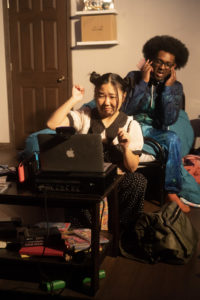
The first act is funnier than the second and has fewer “talking heads”, although in the second act, we see how each of the characters grow. We witness how the child in Jayden dissolves as he has to figure out who he is and what makes him the adult he aspires to be. We begin to see the softer—and perhaps more authentic—side of almost everyone. Ant, for example, drops the gun and admits that her given name is Marie Antoinette. Jayden’s mother provides him with a long explanation for why she is as harsh as she is: because she only wants what’s best for her son.
While this show is supposed to be a world premiere, it feels like a work-in-progress. Several subplots are unnecessary, most of which have to do with the character of Gao-Ming. Her focusing on makeup and the YouTube channel and having her father work for the tollway authority are all superfluous to the plot, as is her insistence that her father must watch her on her computer’s video camera while she and Jayden work on their project together. I was waiting to see her and Jayden have some more personal interaction while hashing out ideas on the topic. But this never happens. Unfortunately, the audience sees her as the only one who presents the oral report to the class. The only inkling that we have that Jayden actually delivered his portion is by implication: after a scene change when his teacher says to him: “You gave a good report.” I would have liked to have seen the young man state in one or two sentences the most important thing he learned from doing the assignment. Instead the audience’s focus is shifted to the challenge that Jayden has given his teacher—which will give you something to think about when you come to the theatre and watch the performance.
Scenic design by Rose Johnson is fantastic for such a small stage. I particularly loved how the Home Depot boxes were gradually lifted throughout the performance to reveal furniture, DVDs, and bedroom items. Costumes by Aurora Medina work well for the current era. Lighting design by Piper Kirchhofer is great, especially when it comes to the nighttime scenes. I liked the creative use of neon lights of different colors to point up the shelves of books in Jayden’s room. Sound designer Max Cichon is right on target. That said, listening to all that static from the toll bridge was grating, especially when we couldn’t make out what Gao-Ming’s father was saying to his daughter. I couldn’t figure out why any of this was necessary in the first place and repeated several times over.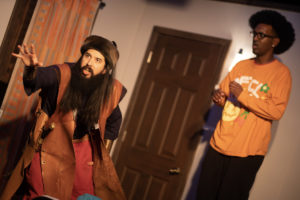
In all, when Jayden meets up with the real Genghis Khan, the question in the audience’s mind is whether this occurs in a dream or in reality or in his imagination. But this is not the point of the show. The fact is that the encounter helps him learn something about history: that it is real, alive, and fluid. It is a current that runs through all of life, and we are each a part of it. It is by examining people and cultures other than his own that Jayden discovers that African Americans are not the only people who have been discriminated against and persecuted during the march of time. He comes to realize that war, violence, and shows of strength are common in all manner of cultures and civilizations. Once Jayden becomes aware that you can see yourself in others—no matter who they are or whether they reside on a high or low rung in society—then you can gain knowledge from each of their experiences and perspectives. You are being given the gift of a wider outlook on life and the privilege of becoming an adult. The message of this show is a good one. And the rest is history.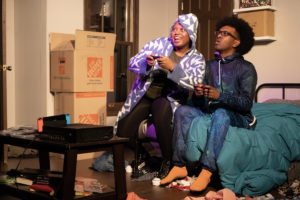
“The Great Khan” is playing through February 26, 2023, at Redtwist Theatre, 1044 W. Bryn Mawr Avenue, in Chicago.
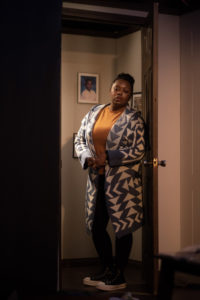 Tickets are $40.
Tickets are $40.
Students, military, and senior discounts are available.
Performance schedule:
Thursdays, Fridays, Saturdays – 7:30 p.m.
Sundays – 3:30 p.m.
For more information or to purchase tickets, go to: https://www.redtwisttheatre.org/ or email: reserve@redtwist.org.
Note that due to the intimacy of this small storefront theatre, strict COVID protocols are in effect:
Masks will be required for audiences inside the building.
Patrons must be able to show proof that they are fully vaccinated via a physical copy of their vaccination card, a clear photo of their full card, or a link to their pharmacy’s confirmation of vaccination or vaccination confirmation via their app.
“Fully vaccinated” means that either 14 days have passed since receiving either the final dose of FDA or WHO authorized vaccines.
Redtwist will offer exemptions for those unable to be vaccinated, such as children under 5, people with certain medical conditions preventing vaccination, or those with closely held religious beliefs that prevent vaccination. These patrons must provide proof of a negative COVID-19 test—within the last 48 hours—before performance start time.
PLEASE NOTE THAT REDTWIST RESERVES THE RIGHT TO REFUSE ENTRY TO THOSE WHO ARE UNABLE TO MEET THE ABOVE REQUIREMENTS. THE BOX OFFICE WILL BE HAPPY TO RESCHEDULE TICKETS WHEN POSSIBLE IN THAT EVENT.
To see what others are saying, visit www.theatreinchicago.com, go to Review Round-Up and click at “The Great Kahn”.






More Stories
“The Firebugs” reviewed by Julia W. Rath
“The Book of Grace” Al Bresloff with another from Paul LIsnek
“The Last Five Years” MILWAUKEE